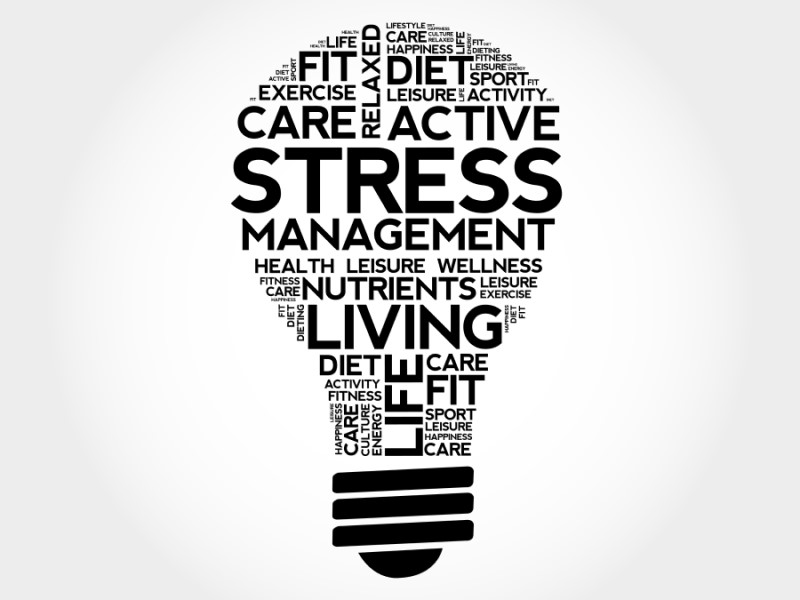Seven ways to manage stress and anxiety in lockdown

As a clinical nurse consultant, I see many people who suffer from stress and anxiety. Here are my seven tips to help you and your employees combat feelings of stress and anxiety:
1. Breathe
- Focus on your breathing – controlling breathing sends your body a message not to panic. Specific breathing techniques can help reduce stress and anxiety at a physiological level by slowing your heart rate and helping you feel calmer.
- Breathe in slowly through your nose and feel your belly expand. Hold your breath for 3-4 seconds, then exhale through your mouth slowly for a count of 6 to 7, making a gentle blowing sound as you do so. The crucial element is to focus on your exhale breath as it sends signals to your body to calm down.
- Focusing on your breath aligns with mindfulness practices. This helps you stay in the present without the distractions of the past which you can’t change and the uncertain future.
- Try searching for wellbeing techniques on reputable professional sites to find ones that work for you.
2. Stay in touch with people you care about
- Call a friend or family member just to talk or enjoy spending time with them. Sometimes just reaching out can make things seem so much brighter.
- Getting things off your chest is healthy, whether you need a shoulder to cry on or to talk about something that’s bothering you.
- Ask for help if you feel distressed or at risk and you can’t reach a friend or family member. You can get help through your GP practice, NHS 111 or community-based services like Mind, Sane or the Samaritans. Just reach out – there will always be someone there.
3. Take some time for you
- Take a break from social media – it can become overwhelming with constant interruptions.
- Limit your exposure to the news to short bursts or one bulletin a day, so it doesn’t fuel your stress and anxiety.
- Relax with something you enjoy like music or reading a good book. Sometimes something as simple as soaking in a hot bath can be a total treat.
4. Pick up a hobby or do something physical
- Take advantage of the weather and enjoy simple pleasures such as feeling the sun and breeze on your face.
- Take a walk or bike ride once a day.
- If you have some outdoor space, connect with nature, whether by getting your hands dirty in the garden or simply by observing birds, insects or other flora or fauna.
- Change your focus by picking up old hobbies like gardening, cooking, baking, drawing, knitting, sewing, writing a letter – whatever gives you pleasure or just takes your fancy.
5. Be kind to yourself
- Being kind to yourself is the first step to compassionate awareness.
- Dance, sing, laugh or just “be” rather than doing something for a short time.
- Avoid using harmful coping mechanisms like alcohol or drugs.
- Don’t set yourself unrealistic goals if you’re feeling stressed or anxious – it will only add to the pressure you may be feeling.
- Cut yourself some slack if you’re feeling a little wobbly – it’s okay not to be okay.
6. Laughter is medicine for the soul
- Laughter is a good medicine for all life’s ills as it releases endorphins which are the body’s natural happy chemicals, helping to lift your mood.
- Laughter strengthens relationship bonds. It can reduce pain, boost energy and help you relax.
- Laugh with the people you live with or call someone and share a joke or amusing story, watch funny videos, tell jokes, relive happy memories, be silly, or just do anything that makes you feel like laughing.
7. Remind yourself that life will return to normal
- Take the time to learn to sleep better, exercise regularly and recharge your batteries so you’re ready for when normality resumes.
- Focus on being kind to yourself and compassionate to others.
- Reach out for help when you need it.
Hopefully, these tips and hints will help you take charge of your wellbeing and look after yourself and your employees. Throughout this trying time, please stay safe and stay connected.
The author is Heather Buckeridge, a qualified mental health and general nurse in the UK and a registered nurse in the USA. Alongside her nursing qualifications, she has a BSc in Health Promotion, a MA in Healthcare Law and Ethics, and a MSc in Mindfulness. Heather has worked for Aviva UK Health since 2000 and is currently involved in employer-employee education by supporting health and wellbeing in the workplace.
This article is provided by Aviva.
Supplied by REBA Associate Member, Aviva
Our purpose is to be with you today, for a better tomorrow.







